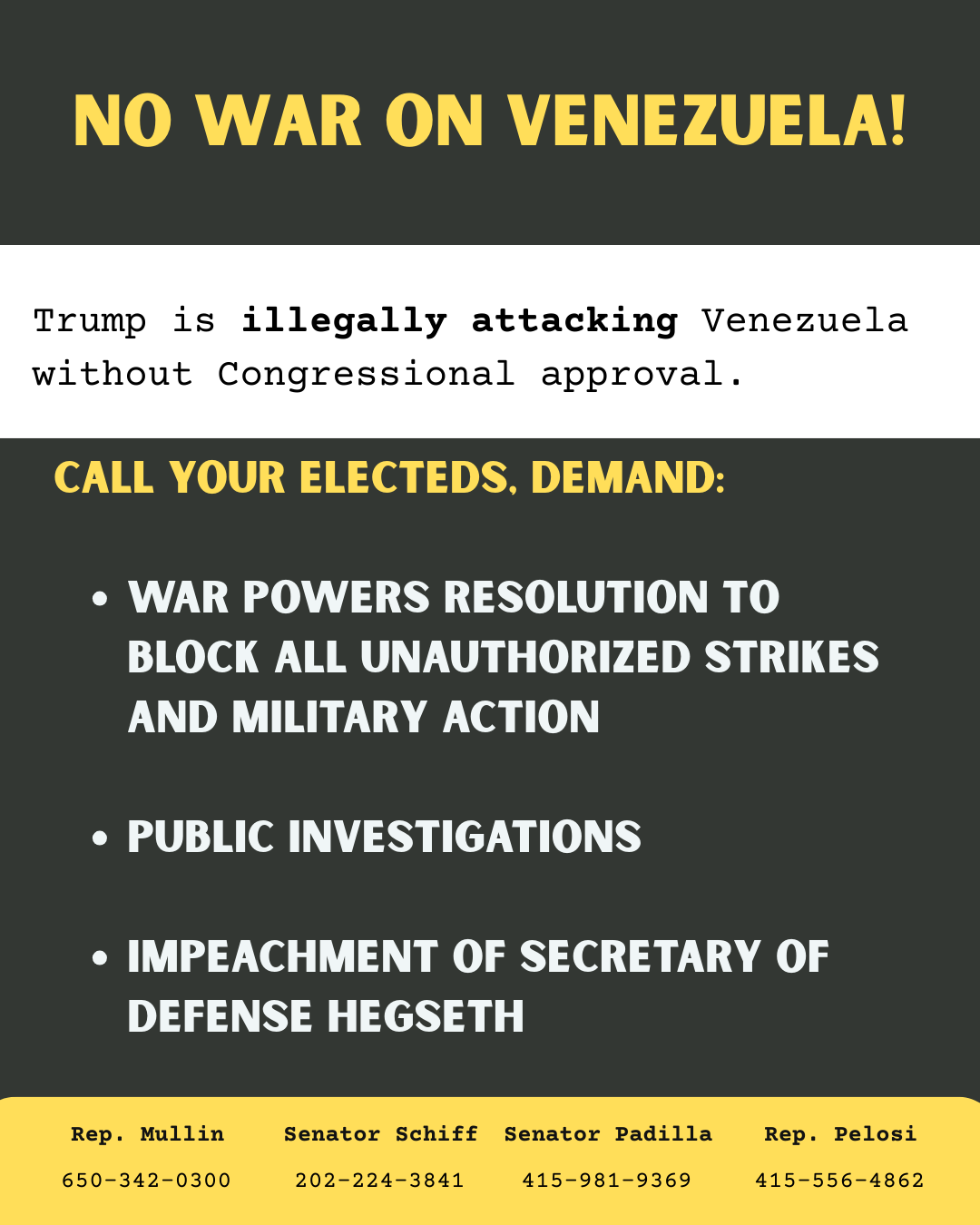Tell your Senators and President Biden: Yes please, pass the Freedom To Vote Act ASAP!
Call BOTH of your Senators.
Contact the White House via their comment line or web form.
Hate the phone? Resistbot is your friend. If you use Resistbot or write an email to your elected officials, make sure to use your own words. Copy-pasted emails are discounted by Congressional staff. In-depth, personal stories are most effective.
Call Script
My name is __________. I am a constituent, and my zip code is _______. I am a member of Indivisible SF.
To President Biden: We’ve got it now; Senator Manchin and his team were given time to draft a compromise voting rights bill, and they’ve produced a great one: the Freedom to Vote Act, well-written to make sure all Americans have equal access to the ballot box, free of intimidation and election subversion. We need you to exert your personal influence on any Senate Democrats who are resisting eliminating the filibuster or creating a voting-rights carve out to pass this compromise bill right away.
To Senator Padilla: Thank you for writing the Freedom to Vote Act with Senator Manchin and others. It’s an excellent bill that should be passed without any excuses like the hide-bound filibuster standing in the way. Remind your colleagues that it was written with the input of 2 former Secretaries of State to protect our voting rights from the rising tide of voter-suppression and election subversion we have seen since January 6, 2021.
To Senator Feinstein: Your colleagues have introduced an excellent compromise voting rights bill after three months of negotiations. Now it is time to get the Freedom to Vote Act passed without delay. Please give it your full support, including eliminating the filibuster or at least creating a carve-out for voting rights to pass it right now.
Background
We admired, supported and fought for the passage of the For the People Act (FTPA) because it encompassed not only voting rights but crucial ethics and campaign finance reforms that would have thoroughly transformed and strengthened our democracy. However, some corporate Senate Democrats were uneasy about its scope, so a team was formed that negotiated for months to create a compromise voting rights bill. (1, 2) As a result, while the Freedom to Vote Act (FTVA) is in some respects stronger on voting rights, the FTPA ethics reforms for government officials have been removed from the FTVA and while campaign finance (dark money) provisions remain, they have been weakened somewhat. Nevertheless, now that the FTVA has been introduced, we have renewed momentum for democracy reform and will keep pushing to get it passed. (3)
According to voting rights law expert Marc Elias, the Freedom to Vote Act is stronger than the FTPA in some crucial ways (5) because it addresses issues not anticipated when the FTPA was first introduced in March 2019, such as:
Federal protections to insulate election officials from undue partisan interference
Makes intimidation of election workers a crime
Restricts the ability of partisan poll watchers to challenge a voter’s qualifications
Requires states to use voting systems with a verifiable paper trail
Provides federal election records and infrastructure heightened protections to ensure the integrity and security of voting systems.
Another revolutionary aspect of the Freedom to Vote Act is incorporated from Senator Ossoff’s Right to Vote Act that would establish a statutory right to vote for the first time.
States would be prohibited from enacting laws that make voting harder
New restrictions would be subjected to heightened scrutiny by the courts, by allowing virtually any voting rights case to be filed in the U.S. District Court for the District of Columbia, which could lead to a national, uniform pro-democracy jurisprudence.
You may have heard about concessions to Republicans in the bill, but those also have limitations:
Voter ID provisions only apply to states that already have Voter ID in place and significantly expand the types of documentation to be used for voter validation. (We are confident that Senators Warnock, Padilla and others tried to ban Voter ID because it discriminates against poor people. We would still like it to be banned, but not at the expense of extending negotiations for several more weeks.)
Voter roll purging is not eliminated but there are limitations placed on voter roll caging and the maintenance of voter lists.
There are many other exciting voting rights reforms in the Freedom to Vote Act that make it well worth fighting for, including
Federal Minimum Standards for Vote By Mail
Automatic Voter Registration
Election Day as a Federal Holiday
Early Voting Standards
Restrictions on Partisan Redistricting (Gerrymandering)
Preventing State Election Subversion
Protection of Election Records, Election Infrastructure and Ballot Tabulation
Nonpartisan Election Official Recruitment and Training
Duty to Report Foreign Election Interference
Criminal Penalties for Voter Intimidation
Combating Secret Money (per elements of the DISCLOSE Act & Honest Ads Act)
We urge you to read DemCast USA’s summary (4) for a detailed examination.
References
Manchin opposes voting rights bill after civil rights leaders' appeal, 6/8/21
Manchin proposes compromise on voting bills ahead of crucial Senate vote, 6/16/21
Pass the Freedom to Vote Act, 9/14/21, Brennan Center
The Freedom To Vote Act, DemCast USA, 9/16/21
The Freedom to Vote Act Unpacked, Democracy Docket, 9/16/21
A Guide to Voter Caging, Brennan Center







